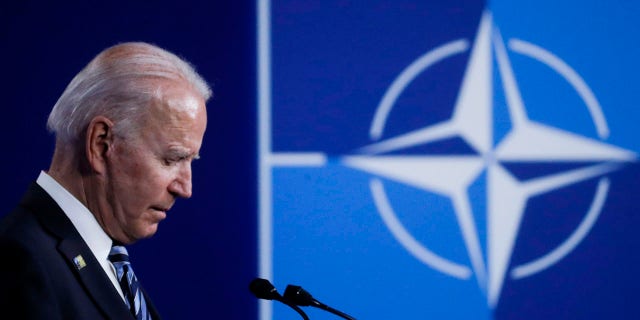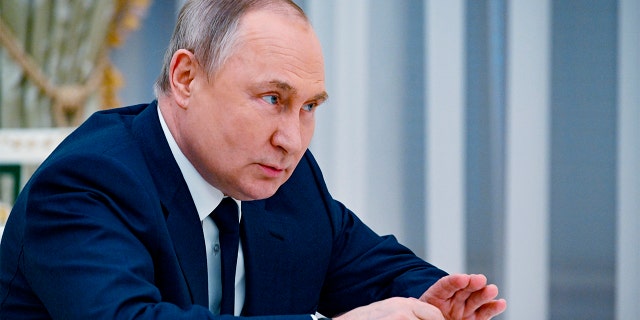NEWYou can now listen to Fox News articles!
JERUSALEM, Israel – President Biden’s appearance at the NATO summit in Madrid on Tuesday presents the most serious test for his administration’s effort to repair a fractured military alliance and roll back Russia’s invasion of Ukraine.
The United States government is widely viewed as the lead partner of the world’s most powerful military body — the 30-member North Atlantic Treaty Organization.
Marshall Billingslea, a former NATO Assistant Secretary General, told Fox News Digital, “This NATO Summit is a crucial test for Biden’s leadership. First, and most importantly, he must clear the way for Finnish and Swedish membership by brokering a deal with Turkey. Second, he has to get countries to deliver significant additional heavy weapons to Ukraine, particularly Germany, who has largely paid only lip-service to military aid.”
BIDEN ATTENDING G7, NATO SUMMITS AMID ‘THE MOST SERIOUS SECURITY SITUATION IN DECADES’
NATO Secretary General Jens Stoltenberg speaks during a media conference prior to a NATO summit in Brussels, Monday, June 27, 2022. NATO heads of state will meet for a NATO summit in Madrid beginning on Tuesday, June 28.
(AP Photo/Olivier Matthys)
Billingslea, a senior fellow at the Hudson Institute, continued:”Third, he needs to move the alliance from its reactive posture into one which will have forces permanently based in the Baltics. Whether he can deliver on any of these is an open question. A final one he needs to help answer with his NATO counterparts is how tough the new Strategic Concept will be with respect to Communist China?”
The major powers in continental Europe — Germany and France — have faced withering criticism for their sluggish response to the Russian invasion and their failure to rapidly send large shipments of heavy weapons to aid Ukrainian forces. Making matters more complicated, Turkey, a NATO member, is refusing to sanction Russia and blocking Finland and Sweden from securing membership in the Western alliance.
“Many different actors are watching Biden’s foreign policy agenda for signs of weakness,” Theodore Karasik, a fellow for Russian and Middle Eastern affairs at the Jamestown Foundation in Washington, told Fox News Digital.
TURKEY’S ISLAMIST LEADER USING NATO TO GET FREE HAND AND PUNISH US ALLIES
“Russia is still uncoiling in Ukraine and on other continents. The test is now about NATO’s security architecture for the next 20 years. The pace and scope of NATO’s armament growth as a result of Russia’s invasion of Ukraine are going to be key for what happens next in Eurasia,” Karasik said.

President Biden goes to the NATO summit in Madrid faced with several pressing issues, first and foremost being Russia’s brutal invasion of Ukraine.
(Olivier Hoslet, Pool via AP)
The stakes are enormously high for Biden because Finland and Sweden are vulnerable to Russian invasion and Moscow is gaining steam in its efforts to conquer more Ukrainian territory.
Karasik added: “President Biden needs to secure Turkey’s active participation in NATO and to stop the country from acting as an ‘adjunct’ to the security organization. A face-to-face meeting between the two leaders [Biden and President Recep Tayyip Erdogan] is necessary. While understanding Turkey’s complaints from Ankara’s point of view, Moscow’s actions concerning the Donbas and the impact on global food and grain supplies warrant greater public unity about what exactly Ankara is seeking in this breadbasket. Russia will keep grinding along if they see these differences of opinion continue especially after the NATO summit.”
UKRAINE MILITARY SUPPORT INCOMING WITH NATO BOOSTING RAPID REACTION FORCE
Ahead of the June 28-30 Madrid summit, NATO Secretary-General Jens Stoltenberg said he expects alliance members to make clear they consider Russia “the most significant and direct threat to our security. He announced that NATO will increase the strength of its rapid reaction force nearly eightfold to 300,000 troops as part of its response to an “era of strategic competition.”
The NATO rapid reaction force currently numbers around 40,000 soldiers who can deploy quickly when needed.
The expansion is part of the “biggest overhaul of collective defense and deterrence since the Cold War,” Stoltenberg said.
“These troops will exercise together with home defense forces,” he said. “And they will become familiar with local terrain, facilities, and our new prepositioned stocks, so that they can respond smoothly and swiftly to any emergency.”
Stoltenberg said the allies will agree to deliver further military support to Ukraine, with NATO members set to adopt a “strengthened comprehensive assistance package” including deliveries of secure communication and anti-drone systems.
NATO LOOKS TO GERMANY FOR PLAN TO BEEF UP DEFENSES IN EUROPE’S EASTERN FLANK

Russian President Vladimir Putin speaks to U.N. Secretary-General Antonio Guterres during their meeting in the Kremlin, in Moscow, Russia, Tuesday, April 26, 2022.
(Vladimir Astapkovich, Sputnik, Kremlin Pool Photo via AP)
Former U.S. Secretary of State Mike Pompeo speaking on Monday’s Fox & Friends said there is a need to “end the war in Ukraine.”
Russian President Vladimir Putin “sent a very clear message about his respect for Biden and our team by launching missiles into western Ukraine, into Kyiv yesterday,” Pompeo said.
The U.S. should provide “targeting capabilities, intelligence and unmanned aerial systems” to Ukraine, the former top diplomat for the Trump administration said.
“The longer we hold back, the longer this goes on, the more Ukrainian lives that are lost, the worse it will be here for us here at home in America. We can see the impact of this war in Europe and the instability there,” Pompeo said.
The dangers posed by the Chinese Communist Party will also be a topic at the NATO summit.
John Kirby, the U.S. National Security Council’s coordinator for strategic communications, recently said, “I think it’s a reflection of our allies’ equal concerns over the effect of Chinese economic practices, use of forced labor, intellectual theft, and coercive aggressive behavior not just in the region but elsewhere around the world. That they believe it’s important to factor China into the new strategic concept.”
CLICK HERE TO GET THE FOX NEWS APP
Amanda Rothschild, a senior policy director for the Vandenberg Coalition and former Senior National Security Speechwriter for President Trump, told Fox News Digital, “Advocating for improved NATO defensive capabilities and burden sharing does not undermine the NATO alliance. It strengthens it. The Trump administration encouraged NATO allies to urgently improve military capabilities and readiness to address a range of current national security threats, including those from Russia. “
She added: “As a result, the number of NATO members meeting their obligation to spend at least 2% of GDP on defense more than doubled, and NATO allies committed to a $400 billion increase in defense spending by 2024. These commitments are a necessary but not sufficient step. Allies must continue to invest in their defensive capabilities, consistent with Article 3 of the NATO treaty.”
The Associated Press contributed to this report.